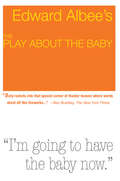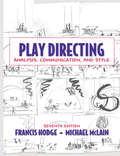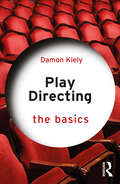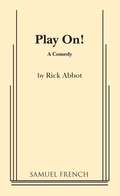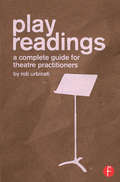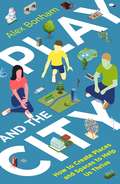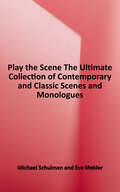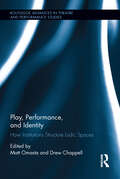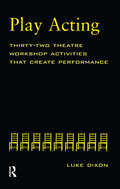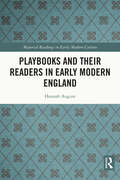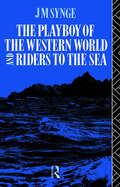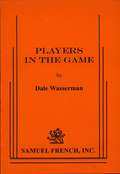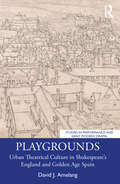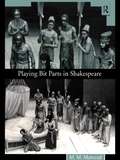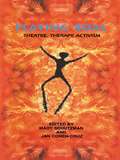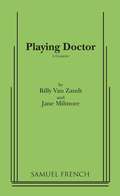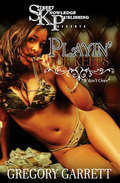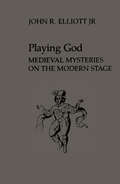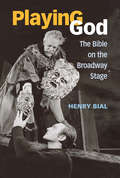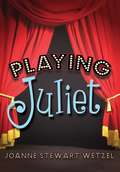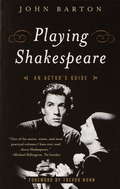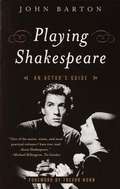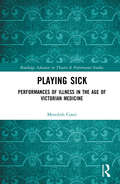- Table View
- List View
Play About the Baby: Trade Edition
by Edward AlbeeWinner of three Pulitzer Prizes for Drama during his long and distinguished career, Edward Albee is one of America’s preeminent playwrights. The Play About the Baby is an absurdist black comedy, reminiscent of burlesque in its high spirits and banter, that grapples with such issues as reality and the games we play to define it, the ambiguity of existence, and the agonizing bonds between parents and children. A fresh young couple—Boy and Girl—have a new baby, whom an older couple—Man and Woman—have come to steal. Why? Because, as Man says, “If you don’t have the wound of a broken heart, how can you know you’re alive?” Brutal loss—the loss of a child or childhood self—has been a recurring Albee theme, and Ben Brantley of the New York Times summed up the critical reaction to The Play About the Baby when he called it a “funny, harrowing dramatic fable … as explicit and concise a statement of what Mr. Albee believes as he is ever likely to deliver.”
Play About the Baby: Trade Edition
by Edward AlbeeWinner of three Pulitzer Prizes for Drama during his long and distinguished career, Edward Albee is one of America's preeminent playwrights. The Play About the Baby is an absurdist black comedy, reminiscent of burlesque in its high spirits and banter, that grapples with such issues as reality and the games we play to define it, the ambiguity of existence, and the agonizing bonds between parents and children. A fresh young couple--Boy and Girl--have a new baby, whom an older couple--Man and Woman--have come to steal. Why? Because, as Man says, "If you don't have the wound of a broken heart, how can you know you're alive?" Brutal loss--the loss of a child or childhood self--has been a recurring Albee theme, and Ben Brantley of the New York Times summed up the critical reaction to The Play About the Baby when he called it a "funny, harrowing dramatic fable ... as explicit and concise a statement of what Mr. Albee believes as he is ever likely to deliver."
Play Directing: Analysis, Communication, and Style
by Michael Mclain Francis HodgePlay Directing describes the various roles a director plays, from selection and analysis of the play, to working with actors and designers to bring the production to life.
Play Directing: The Basics (The Basics)
by Damon KielyPlay Directing: The Basics introduces theatre students to a step-by-step process for directing plays, including advice on devising. Beginning with a historical overview of directing, this book covers every aspect of the director’s job from first read to closing night. Practical advice on finding plays to produce, analysing scripts, collaborating with the design team, rehearsing with actors, devising company creations, and opening a show are peppered with advice from working professionals and academic directors. A practical workbook, short exercises, helpful websites, and suggested reading encourage readers towards a deeper study of the art of directing. This book empowers high school and early college students interested in theatre and directing to find their own voice, develop a practice, and refine their process.
Play On!
by Rick AbbotComedyCharacters: 3 male, 7 female . Interior Set. Perfect for any theatre group, this is the hilarious story of a theater group trying desperately to put on a play in spite of maddening interference from a haughty authoress who keeps revising the script. Act I is a rehearsal of the dreadful show, Act II is the near disastrous dress rehearsal, and the final act is the actual performance in which anything that can go wrong does. When the authoress decides to give a speech on the state of the modern theatre during the curtain calls, the audience is treated to a madcap climax to a thoroughly hilarious romp. Even the sound effects reap their share of laughter.
Play Readings: A Complete Guide for Theatre Practitioners
by Rob UrbinatiPlay Readings: A Complete Guide for Theatre Practitioners demystifies the standards and protocols of a play reading, demonstrating how to create effective and evocative readings for those new to or inexperienced with the genre. It examines all of the essential considerations involved in readings, including the use of the venue, pre-reading preparations, playwright/director communication, editing/adapting stage directions, casting, using the limited rehearsal time effectively, simple "staging" suggestions, working with actors, handling complex stage directions, talkbacks, and limiting the use of props, costumes, and music. A variety of readings are covered, including readings of musicals, operas, and period plays, for comprehensive coverage of this increasingly prevalent production form.
Play and the City: How to Create Places and Spaces To Help Us Thrive
by Alex BonhamPlay is essential, for children but also adults. It's how we relax and revitalise ourselves, build and maintain friendships, try new things, learn and innovate.Cities have always been sites of play, bringing people together and pushing the boundaries of what is humanly possible. And now we need our cities to encourage and facilitate play of all kinds more than ever. If we want a world for our children to play in, we need to have a go at doing things differently. A city that is enjoyable to live in - that provides welcoming spaces, plentiful resources, and an attitude of 'yes, you can' - is a playful city. A city that is good for eight-year-olds as well as eighty-year-olds is a city that's good for all of us. By looking at how different cities across space and time have sought to encourage and facilitate play, Bonham shows us how to conceptualise our own contemporary city as a game, and encourages us to become participants rather than spectators.Play the city! Get involved, make a difference and help to bring your city back to life. There is help here to identify opportunities, build a team of friends and allies, take part - and win! It's time to make your move.
Play and the City: How to Create Places and Spaces To Help Us Thrive
by Alex BonhamPlay is essential, for children but also adults. It's how we relax and revitalise ourselves, build and maintain friendships, try new things, learn and innovate.Cities have always been sites of play, bringing people together and pushing the boundaries of what is humanly possible. And now we need our cities to encourage and facilitate play of all kinds more than ever. If we want a world for our children to play in, we need to have a go at doing things differently. A city that is enjoyable to live in - that provides welcoming spaces, plentiful resources, and an attitude of 'yes, you can' - is a playful city. A city that is good for eight-year-olds as well as eighty-year-olds is a city that's good for all of us. By looking at how different cities across space and time have sought to encourage and facilitate play, Bonham shows us how to conceptualise our own contemporary city as a game, and encourages us to become participants rather than spectators.Play the city! Get involved, make a difference and help to bring your city back to life. There is help here to identify opportunities, build a team of friends and allies, take part - and win! It's time to make your move.
Play the Scene: The Ultimate Collection of Contemporary and Classic Scenes and Monologues
by Michael Schulman Eva MeklerAlexander Dumas - Christopher Durang - Beth Henley - Kenneth Lonergan - Donald Margulies - Steve Martin - Nicky Silver - Bernard Shaw - Alfred Uhry - Paula Vogel A collection of the greatest scenes and monologues ever written ranging from Elizabethan to Tony Award-winning plays comprehensive anthology spans over five hundred years of theatre. Play the Scene: The Ultimate Collection of Contemporary and Classic Scenes and Monologues by coauthors Michael Schulman and Eva Mekler includes scenes and monologues from classic plays by such notable authors as Edith Wharton as well as the best in contemporary theatre, such as Margaret Edson's Wit. - Blight Spirit - Camille - The Chosen - The Graduate - How I Learned to Drive - The Last Night of Ballyhoo - The Lisbon Traviata - This Is Our Youth - Vincent in Brixton - And many more!
Play, Performance, and Identity: How Institutions Structure Ludic Spaces (Routledge Advances in Theatre & Performance Studies)
by Matt Omasta Drew ChappellPlay helps define who we are as human beings. However, many of the leisurely/ludic activities people participate in are created and governed by corporate entities with social, political, and business agendas. As such, it is critical that scholars understand and explicate the ideological underpinnings of played-through experiences and how they affect the player/performers who engage in them. This book explores how people play and why their play matters, with a particular interest in how ludic experiences are often constructed and controlled by the interests of institutions, including corporations, non-profit organizations, government agencies, religious organizations, and non-governmental organizations (NGOs). Each chapter explores diverse sites of play. From theme parks to comic conventions to massively-multiplayer online games, they probe what roles the designers of these experiences construct for players, and how such play might affect participants' identities and ideologies. Scholars of performance studies, leisure studies, media studies and sociology will find this book an essential reference when studying facets of play.
Play-Acting: A Guide to Theatre Workshops
by Luke DixonPlay-Acting is an inspired book of theatrical beginnings-jumping-off points for actors, teachers, and directors. Drawing upon his thirty years of designing and leading theater workshops, Luke Dixon goes to the heart of contemporary theater practice. Whether drawing upon Japanese butoh, Shakespearean verse, or African rhythms, these thirty-two workshops cover a wide range of activities-voice warm-ups, body work, the exploration of theatrical space, life games, dreamtime, sense and chakras, working with the spine, and much, much more. More than a collection of exercises, Play-Acting is constructed to take the user on a journey from learning about the anatomy of the individual actor's body to the performance of narrative by a group of actors. With tips on what you might expect to experience as an actor, teacher, or director, along with ideas on how to exploit the unexpected in performance, Play-Acting is a book to be read again and again.
Playbooks and their Readers in Early Modern England (Material Readings in Early Modern Culture)
by Hannah AugustThis book is the first comprehensive examination of commercial drama as a reading genre in early modern England. Taking as its focus pre-Restoration printed drama’s most common format, the single-play quarto playbook, it interrogates what the form and content of these playbooks can tell us about who their earliest readers were, why they might have wanted to read contemporary commercial drama, and how they responded to the printed versions of plays that had initially been performed in the playhouses of early modern London. Focusing on professional plays printed in quarto between 1584 and 1660, the book juxtaposes the implications of material and paratextual evidence with analysis of historical traces of playreading in extant playbooks and manuscript commonplace books. In doing so, it presents more detailed and nuanced conclusions than have previously been enabled by studies focused on works by one author or on a single type of evidence.
Playboy of the Western World: A Comedy In Three Acts (Classic, 20th-century, Penguin Ser.)
by J.M SyngeFirst published in 1979. Routledge is an imprint of Taylor & Francis, an informa company.
Players in the Game
by Dale WassermanDrama / 9m, 4f / Unit Set / The Bishop of fourteenth century Prague is humane, witty and happily immoral, which suits his city just fine. However, it displeases the Pope who sends a clever young Inquisitor to force obedience from the Bishop, triggering a collision that ends shockingly. You’ll recognize the game as that old, “Who’s Got The Power?” but you’ve never seen it played for such amazing stakes.
Playgrounds: Urban Theatrical Culture in Shakespeare’s England and Golden Age Spain (Studies in Performance and Early Modern Drama)
by David J. AmelangThis book compares the theatrical cultures of early modern England and Spain and explores the causes and consequences not just of the remarkable similarities but also of the visible differences between them. An exercise in multi-focal theatre history research, it deploys a wide range of perspectives and evidence with which to recreate the theatrical landscapes of these two countries and thus better understand how the specific conditions of performance actively contributed to the development of each country’s dramatic literature. This monograph develops an innovative comparative framework within which to explore the numerous similarities, as well as the notable differences, between early modern Europe’s two most prominent commercial theatre cultures. By highlighting the nuances and intricacies that make each theatrical culture unique while never losing sight of the fact that the two belong to the same broader cultural ecosystem, its dual focus should appeal to scholars and students of English and Spanish literature alike, as well as those interested in the broader history of European theatre. Learning from what one ‘playground’ – that is, the environment and circumstances out of which a dramatic tradition originates – reveals about the other will help solve not only the questions posed above but also others that still await examination. This investigation will be of great interest to students and scholars in theatre history, comparative drama, early modern drama, and performance culture.
Playing Bit Parts in Shakespeare
by Professor M Mahood M.M. MahoodPlaying Bit Parts in Shakespeare is a unique survey of the small supporting roles - such as foils, feeds, attendants and messengers - that feature in Shakespeare's plays. Exploring such issues as how bit players should conduct themselves within a scene, and how blank verse or prose may be spoken to bring out the complexities of character-definition, Playing Bit Parts in Shakespeare brings a wealth of insights to the dynamic of scenic construction in Shakespeare's dramaturgy. M.M. Mahood explores the different functions of minimal characters, from clearing the stage to epitomizing the overall effect of the comedy or tragedy, and looks at how they can extend the audience's knowledge of the social world of the play. She goes on to describe the entire corpus of minimal roles in a selection of six plays: * Richard III * The Tempest * King Lear * Antony & Cleopatra * Measure for Measure * Julius Caesar This new edition comes enhanced with a new Appendix, 'Who Says What', especially designed to aid directors in making decisions about the speaking parts of the minimal characters. It also comes complete with an index of characters (including line references) as well as a detailed general index. An invaluable aid for directors and actors in the rehearsal room, this perceptive and informative volume is equally of interest to students studying and writing about Shakespeare's plays.
Playing Boal: Theatre, Therapy, Activism
by Jan Cohen-Cruz Mady SchutzmanPlaying Boal examines the techniques in application of Augusto Boal, creator of Theatre of the Oppressed, Brazilian theatre maker and political activist. This text looks at the use of the Theatre of the Oppressed exercises by a variety of practitioners and scholars working in Europe, North America and Canada. It explores the possibilities of these tools for "active learning and personal empowerment; co-operative education and healing; participatory theatre and community action." This collection is designed to illuminate and invigorate discussion about Augusto Boal's work and the transformative potential of theatre. It includes two interviews with Boal, and two pieces of his own writing.
Playing Doctor
by Billy Van ZandtFarce / 5m, 3f / Int. Rob Brewster's parents are very, very proud of their son the doctor. What they don't know is that Rob has used all the money they gave him for medical school to live on as he as has pursued his fledgling writing career. Inevitably, Rob's day of reckoning comes when his parents arrive for a visit. Quickly, he enlists the help of his secretary to be his nurse and his roommate Jimmy to round up his actor friends to pretend to be patients. Complications ensue when Jimmy decides he is such a good actor that he can impersonate all the patients, with the help of a trunk of costumes and bad dialects! The authors have written some zany farces but this one may just be their zaniest. It is great fun to perform, and great fun to see. "Wonderful... wacky comedy... will undoubtedly become standard dinner theatre fare across the country... contains more wit than is usual in sex farce." - Asbury Park Press
Playing For Keeps
by Gregory GarrettFaced with a 30 year sentence in Federal prison, Dontae can no longer hold on to the envisions of the outside life he left behind, including family. As hard as it may get, he is determined to do the time and not let the time do him. Offered a get out of jail free card, will he continue to favor his pride? Can he remain strong enough throughout the rest of his bid before the mental strees and anguish taking its roll? Q'Tee vowed to love, honor, and cherish for better or worse until death do us part. With her husband, Dontae serving a lengthy sentence, she won't stop at nothing to help free him. By any means neccessary! After re-acquainting herself with an old fling, Marco, she becomes side tracked momentarily by paths of lust, lies, and unbridled affection. Gradually, her world turns upside down. Surprisingly, Q'Tee soon will discover Marco is the ideal player that changes the game. Will Q Tee's love out weigh Dontae's pride?
Playing God: Medieval Mysteries on the Modern Stage
by John R. ElliottReligious drama was one of the most vital art forms of the medieval era. In medieval mystery plays, God appeared as one of the characters, along with angels, saints, the devil, and others. Until very recently however, the revival of interest in medieval culture has not included drama, beacuse of a lingering fear of blasphemy associated with the representation of God on the stage. In Britain this fear was the legacy of a theatrical censorship which has been exercised by the Lord Chamberlain's office for hundreds of years. Since that power was abolished in 1968, medieval religious, or mystery, plays are once again appearing on the stages of many countries. John R. Elliott Jr. studies the modern context of this important medieval genre. He begins by describing general attitudes towards religious drama from the time of the reformation, the popularity of the Oberammergaru Passion Play in Victorian times, and specific attempts by producers to overcome official hostility to religious plays. He traces the history of the major modern productions of the mystery cycles, such as the York Festival and the Bristol University performance of the Cornish Ordinalia, and provides information about the careers of the two leading pioneers of modern mystery-play production. The concluding chapter discusses the chief practical and aethetic problems involved in staging mystery plays for modern audiences, and assesses the overall importance of their revival in the larger context of British there today.
Playing God: The Bible On The Broadway Stage
by Henry Carl BialWhether we regard it as the collected inscriptions of an earlier oral tradition or as the divinely authored source text of liturgical ritual, the Bible can be understood as a sacred performance text, a framework for an instructional theater that performs the shared moral and ethical values of a community. It's not surprising, then, that playwrights have turned to the Bible as a source for theatrical adaptation. Biblical texts have inspired more than 100 Broadway plays and musicals, ranging from early spectacles like Ben-Hur (1899) to more familiar works such as Godspell and Jesus Christ Superstar. What happens when a culture's most sacred text enters its most commercial performance venue? Playing God focuses on eleven financially and/or critically successful productions, as well as a few notable Broadway flops that highlight the difficulties in adapting the Old and New Testaments for the stage. The book is informed by both performance studies and theater history, combining analysis of play-scripts with archival research into the actual circumstances of production and reception. Biblical plays, Henry Bial argues, balance religious and commercial considerations through a complex blend of spectacle, authenticity, sincerity, and irony. Though there is no magic formula for a successful adaptation, these four analytical lenses help explain why some biblical plays thrive while others have not.
Playing Juliet
by Joanne Stewart WetzelBeth Sondquist, age twelve and a half, dreams of playing the part of Juliet. For now she’s just the cat in Cinderella, but one day, she’s determined to become a real actress. But all her hopes for an acting career come crashing down when the Oakfield Children’s Theater is slated to be closed. Its new owner has decided to make it into an adult theater, a real theater. Beth and her best friend, Zandy, are willing to do whatever it takes to save the theater, but their plans quickly go awry. When Beth’s father catches her sneaking back into her bedroom window well past bedtime, Beth is in big, big trouble. With eviction looming, the children’s theater director decides to close the theater with the same play the theater opened with fifty years ago--Romeo and Juliet. But Beth’s grounded for the next two weeks, and she won’t be able to try out. How will Beth pull off playing Juliet if she can’t even make tryouts? Playing Juliet is funny and honest and celebrates bravery and doing the right thing even when it gets you into trouble. It’s about having the courage to go after what you want and making your dreams come true. It’s also about friendship and family. As an almost-thirteen-year-old, Beth has a unique bond with thirteen-year-old Juliet, and she eventually recognizes just how silly and immature Juliet’s decisions are. Only Beth can play Juliet as the kid that she is. With a little bit of luck, maybe she’ll get her chance.
Playing Shakespeare
by John BartonNow in its first American edition, Playing Shakespeare is the premier guide to understanding and appreciating the mastery of the world's greatest playwright.Together with Royal Shakespeare Company actors-among them Patrick Stewart, Judi Dench, Ian McKellen, Ben Kingsley, and David Suchet-John Barton demonstrates how to adapt Elizabethan theater for the modern stage. The director begins by explicating Shakespeare's verse and prose, speeches and soliloquies, and naturalistic and heightened language to discover the essence of his characters. In the second section, Barton and the actors explore nuance in Shakespearean theater, from evoking irony and ambiguity and striking the delicate balance of passion and profound intellectual thought, to finding new approaches to playing Shakespeare's most controversial creation, Shylock, from The Merchant of Venice. A practical and essential guide, Playing Shakespeare will stand for years as the authoritative favorite among actors, scholars, teachers, and students.From the Trade Paperback edition.
Playing Shakespeare: An Actor's Guide
by John Barton Trevor NunnNow in its first American edition,Playing Shakespeare is the premier guide to understanding and appreciating the mastery of the world's greatest playwright. Together with Royal Shakespeare Company actors-among them Patrick Stewart, Judi Dench, Ian McKellen, Ben Kingsley, and David Suchet-John Barton demonstrates how to adapt Elizabethan theater for the modern stage. The director begins by explicating Shakespeare's verse and prose, speeches and soliloquies, and naturalistic and heightened language to discover the essence of his characters. In the second section, Barton and the actors explore nuance in Shakespearean theater, from evoking irony and ambiguity and striking the delicate balance of passion and profound intellectual thought, to finding new approaches to playing Shakespeare's most controversial creation, Shylock, from The Merchant of Venice. A practical and essential guide,Playing Shakespeare will stand for years as the authoritative favorite among actors, scholars, teachers, and students.
Playing Sick: Performances of Illness in the Age of Victorian Medicine (Routledge Advances in Theatre & Performance Studies)
by Meredith ContiFew life occurrences shaped individual and collective identities within Victorian-era society as critically as witnessing or suffering from illness. The prevalence of illness narratives within late nineteenth-century popular culture was made manifest on the period’s British and American stages, where theatrical embodiments of illness were indisputable staples of actors’ repertoires. Playing Sick: Performances of Illness in the Age of Victorian Medicine reconstructs how actors embodied three of the era’s most provocative illnesses: tuberculosis, drug addiction, and mental illness. In placing performances of illness within wider medicocultural contexts, Meredith Conti analyzes how such depictions confirmed or resisted salient constructions of diseases and the diseased. Conti’s case studies, which range from Eleonora Duse’s portrayal of the consumptive courtesan Marguerite Gautier to Henry Irving’s performance of senile dementia in King Lear, help to illuminate the interdependence of medical science and theatre in constructing nineteenth-century illness narratives. Through reconstructing these performances, Conti isolates from the period’s acting practices a lexicon of embodied illness: a flexible set of physical and vocal techniques that performers employed to theatricalize the sick body. In an age when medical science encouraged a gradual decentering of the patient from their own diagnosis and treatment, late nineteenth-century performances of illness symbolically restored the sick to positions of visibility and consequence.
